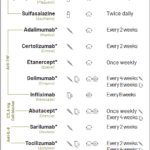Experts identify barriers to shared decision making in rheumatology & offer actionable tools to integrate SDM into practice for better patient outcomes.


Experts identify barriers to shared decision making in rheumatology & offer actionable tools to integrate SDM into practice for better patient outcomes.

At first, there was an incomprehensibly loud explosion. And out of that explosion, about 4.5 billion years afterward, emerged the world’s first rheumatologist. Only a few notable things have happened between these two events, but the most important dynamic has been the continuous expansion of our universe. If the speculations of many cosmologists are correct,…
Experts addressed how education and follow-up for patients with gout can improve disease management and highlighted the need for a better construction of gout remission.

Stephen J. Balevic, MD, PhD, RhMSUS |
Checking blood levels of commonly used disease-modifying anti-rheumatic drugs (DMARDs) has gained widespread attention in the rheumatology community, even resulting in a recent guidance document from EULAR for biologics.1 Although a highly useful tool, drug level measurement in rheumatology is not without challenges; many of our drugs violate the basic principles of pharmacology that we…

Mohammad A. Ursani, MD, FACP, RhMSUS, Iman Qaiser, MD, & Mamdouh Mahmoud, PhD |
Intermittent fasting—defined as alternating between cycles of eating and going without food over a given period of time—has become popular with individuals seeking to lose weight or balance their lifestyle in recent years. During Ramadan (a period based on the Gregorian calendar that changes from year to year), able-bodied Muslims are obligated to observe a…

Antonia Chan & Julia F. Simard, ScD |
Hydroxychloroquine (HCQ) is nearly universally recommended for pregnant patients with systemic lupus erythematosus (SLE) to reduce lupus disease activity and adverse outcomes in pregnancy.1-3 Yet despite strong evidence supporting its benefits, HCQ appears underutilized, with several studies suggesting fewer than half of all women with lupus take this medication during pregnancy.4 How accurately these results…

Michael Putman, MD |
Rheumatologists can do better at helping systemic lupus erythematosus patients from racial and ethnic minority groups adhere to their lupus medication regimens, according to a paper published in Arthritis Care & Research. Researchers from Duke University examined medication adherence barriers from the perspectives of healthcare providers and patients. Their findings suggest more attention should be…

Manuel F. Ugarte-Gil, MD, MSc, & Graciela S. Alarcón, MD, MPH |
A 26-year-old Peruvian woman presented to the emergency department of a large teaching hospital in Lima, Peru, with epistaxis and hematomas that had occurred over the preceding few days; she was found to have severe thrombocytopenia and a normocytic, normochromic anemia. She was treated with pulse doses of methylprednisolone; however, within two days, she presented…

Researchers found half of patients taking the biosimilar infliximab-dyyb (Inflectra) remained highly adherent to medication use after 12 months.

Polly J. Ferguson, MD, Jessica Lynton, PharmD, BCPS, & Beth H. Resman-Targoff, PharmD, FCCP, on behalf of the ARP Membership & Nominations Committee |
The number of medications with rheumatologic indications has increased in parallel with expanding complexities of medication approval and delivery. Simply starting a patient on a biologic medication or new disease-modifying anti-rheumatic drug (DMARD) can be time consuming and frustrating for physicians, nurses and their support staff. In addition to educating the patient and obtaining prior…